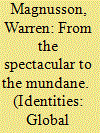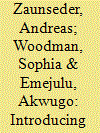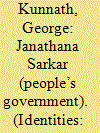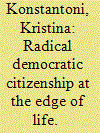|
|
|
Sort Order |
|
|
|
Items / Page
|
|
|
|
|
|
|
| Srl | Item |
| 1 |
ID:
184071


|
|
|
|
|
| Summary/Abstract |
Drawing on immersive ethnographic fieldwork at three events in Scotland, all grounded in ecological sensibilities and focusing respectively on alternative medicine, music and reviving seasonal celebrations, this article illuminates aspects of what we call ‘festive commoning’. We ask: how, and to what extent, were commons ‘against and beyond’ capital produced in these gatherings? We re-read a history of resistance to festive autonomy in this light, as a continuing struggle against capitalist enclosures of time, space, knowledge, history and being in the world. We argue that alternative grassroots gatherings can produce a ‘festive commons’ that resists such enclosures, including breaking down divisions between self and other, human and non-human beings. Such processes generate collective joy, and enliven the radical imagination. Experiencing festive commons is not only an aspect of the pleasure valued in some radical traditions, but also makes another world possible, even if only a temporary one.
|
|
|
|
|
|
|
|
|
|
|
|
|
|
|
|
| 2 |
ID:
184068


|
|
|
|
|
| Summary/Abstract |
Radical democracy is usually fleeting. What are the possibilities for institutionalising it? If we want to understand them, we have to look carefully at the institutions and practices of local government and distance ourselves from the ideal of the nation-state, focusing instead on the possibilities of the open city. In that context, this article refers back to the work of Hannah Arendt and Robert Dahl, considering it in light of more recent contributions from Nancy Rosenblum, Andy Merrifield, Jacques Ranciere, and others.
|
|
|
|
|
|
|
|
|
|
|
|
|
|
|
|
| 3 |
ID:
184064


|
|
|
|
|
| Summary/Abstract |
For our special issue, ‘Radical Democratic Citizenship: From Practice to Theory’, we examine different forms of radical theorising and politics at the grassroots. Radical democratic citizenship entails forms of struggle against gross social, economic and political miseries and injustices. This special issue explores the implications of a renewed wave of revolutionary grassroots action. ‘Radical’ indicates firstly the potential for sustained fundamental change of the economic and political landscape that, secondly, is pursued from the grassroots, and, thirdly, through an egalitarian, democratic process that are transformative in rethinking and reshaping the parameters of what democracy can and should be. We raise the question of how localised alternatives -– which have been the most fertile terrain for such generation of different worlds – might be able to address wider questions of global inequality on our finite planet.
|
|
|
|
|
|
|
|
|
|
|
|
|
|
|
|
| 4 |
ID:
184067


|
|
|
|
|
| Summary/Abstract |
This article focuses on the agency of the poor in the context of rebel governance in rural India. During its five-decade-long armed agrarian struggle, the Maoist movement has established in several villages an alternative structure of governance called Janathana Sarkar (people’s government) with Adivasis and Dalits as the primary agents of social transformation. Drawing on the author’s long-term ethnographic fieldwork in the Maoist guerrilla zones, this article explores the insurgent consciousness of Dalits and Adivasis by engaging with two interrelated questions. First, how does Janathana Sarkar function as a platform for radical democracy by the marginalised? Second, is violence inherent in the emergence and manifestation of this agency? These questions, although primarily focused on the agency of Dalits and Adivasis in Janathana Sarkar, have a wider relevance to the study of transformative politics of the poor and radical democracy, which have received inadequate attention in the scholarship on rebel governance.
|
|
|
|
|
|
|
|
|
|
|
|
|
|
|
|
| 5 |
ID:
184069


|
|
|
|
|
| Summary/Abstract |
Current approaches to radical democratic citizenship seek to open up new spaces for political action and politicise ordinariness. However, a question remains as to the extent to which current radical approaches to citizenship include one of the most overlooked groups: very young children. This article focuses on radical democratic citizenship and early childhood (0 to 8 years old), where rights are often violated and activism is not always recognised, particularly in everyday public spaces. Drawing on critical reflections from recent research projects focusing on young children’s rights in everyday public spaces, I argue that radical democratic citizenship in early childhood can be conceptualised through intergenerational and intersectional activism and through an analysis of children’s ordinary political acts which render visible processes of radical change.
|
|
|
|
|
|
|
|
|
|
|
|
|
|
|
|
| 6 |
ID:
184070


|
|
|
|
|
| Summary/Abstract |
Worker co-operatives generally embrace democracy in their ownership and decision-making structure. However, the commitment to a flat organisational hierarchy, implementation of equal wage policy, and the pursuit of a strong ethical policy position these co-operatives on the highly principled side of the co-operative landscape in the UK. This paper draws on an ethnographic study of five such principled workers’ co-operatives operating in a most adverse economic context, the UK capitalist market economy. The study explores collective decision-making and the personal investment as two important political aspects. Workplace democracy and the personal are interlinked paradigms for political praxis – as practiced democracy, immanent critique of the hegemonic corporate way of organising work, as well as prefiguring a viable alternative. Taking the perspective of radical worker co-operatives, this article caters to an urgently needed conceptualisation of radical democratic citizenship at work.
|
|
|
|
|
|
|
|
|
|
|
|
|
|
|
|
| 7 |
ID:
184065


|
|
|
|
|
| Summary/Abstract |
This article explores an intriguing emergent organising strategy among women of colour activists in London and Amsterdam: a politics of refusal. In response to the triple catastrophes facing women of colour: the on-going roll back of social welfare states, the normalisation of the far right in everyday life and the xenophobic backlash against migrants, we find that some women of colour activists are deliberatively withdrawing from view and working outside of dominant left activist spaces. Rather than demanding recognition and rights from institutional actors and supposed allies, many activists appeared to welcome and embrace their marginalisation as this exclusion from mainstream life creates the possiblity for alternative ways of doing politics and being political. Drawing on the work of Audra Simpson, we attempt to map the contours of women of colour’s refusal politics and consider how refusal generates different approaches to sovergenity and ungovernability.
|
|
|
|
|
|
|
|
|
|
|
|
|
|
|
|
| 8 |
ID:
184066


|
|
|
|
|
| Summary/Abstract |
This article discusses radical democratic citizenship in the context of the ‘Rojava Revolution’, an ongoing society-building effort that emerged in majority Kurdish regions in the context of the Syrian war. It describes aspects of the political vision of Abdullah Öcalan, as interpreted and applied by activists involved in the democratic self-governance system in Rojava (northern Syria), since 2012. Drawing on ethnographic fieldwork in the region, the article focuses on the ways in which activists frame their revolution and notions of radical democratic citizenship as consciousness-raising efforts against the state system. Centering the role of educational institutions, it argues that theoretical discussions within the Kurdish freedom movement seek to emancipate political action from state-centric ways of articulating political will, justice demands, and wider geopolitical interests. Lastly, it encourages studying radical democracy efforts by taking seriously the political vocabularies, everyday practices, and long-term perspectives advanced in collective self-organisation from below.
|
|
|
|
|
|
|
|
|
|
|
|
|
|
|
|
|
|
|
|
|